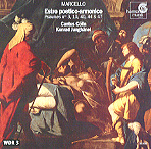What is this extraordinary music? you’ll find yourself asking within the first few seconds of the first track. Benedetto Marcello, a contemporary of Bach and Vivaldi but in these works sounding as if from another planet, usually is heard in instrumental chamber music performances–the cello or harpsichord sonatas, for instance. After hearing these incredibly varied and inventive vocal works, it seems odd that more of Marcello’s music in this genre (and he wrote quite a lot of it) isn’t performed. Marcello was a sort of Venetian Charles Ives: gainfully employed–in law and government–he didn’t depend on his musical endeavors to make a living. And, as in the case of Ives, he took this total artistic freedom–and his considerable compositional talent–to its limit. As shown in these Psalm settings for various combinations of four voices, he paid virtually no attention to conventional ideas about form, and he didn’t necessarily care about maintaining consistency of style from one section of a piece to another. The five selections performed here are from Marcello’s settings of Italian paraphrases of the first 50 Psalms. Never dull for a moment, often surprising, and full of very beautiful music, these works show Marcello’s exceptional artistry, which in his day was recognized throughout Europe.
It would take many paragraphs to describe the eventful progression of any one of these works, each of which is divided into different numbers of verses depending on the particular psalm. You might hear a duet, then a solo, then a trio, each in a slightly different style, from operatic drama to something akin to folksong. Then, as at the end of Psalm 10, suddenly we hear something that can best be described as a carol. Next might be a recitative followed by a duet dialog, then a chorus that sounds like a madrigal. In the fourth verse of the Third Psalm almost out of nowhere we’re treated to a lovely little song, then a delightful duet that just carries you away with its separate but naturally flowing melodies. Unfortunately, the psalms’ individual verses aren’t directly accessible–no one seems to use indexing anymore–which makes it very difficult to skip to a favorite section or just jump back to the beginning of the previous verse. But aside from this puzzling technical glitch, you’ll certainly be impressed by the uniformly fine singing (alto Elisabeth Popien and bass Stephan Schreckenberger are outstanding) and the sensitive continuo playing. These performers really make this music live and breathe, capturing the poetic beauty and character of the psalms as heartfelt human utterances. You’re really missing something if you don’t hear this.
































